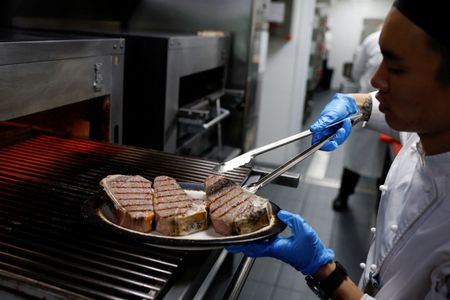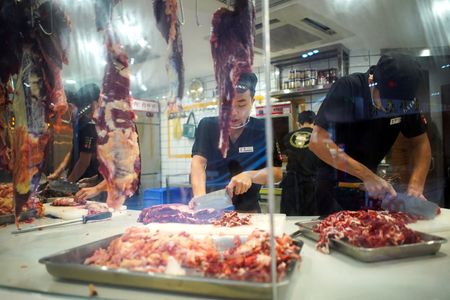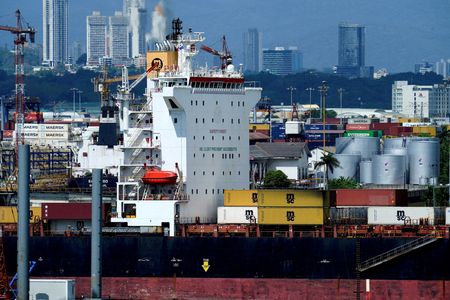By Ella Cao and Tom Polansek
BEIJING (Reuters) -China said it would deliver a “fair and objective” ruling following a hearing in its ongoing investigation into beef imports that could lead to higher tariffs or import limits if it finds domestic producers are at risk.
Launched last year, the review covers all imported beef rather than that from any specific country and coincides with slower demand and a domestic supply glut that has hit China’s beef market – the world’s largest for imports and consumption.
Monday’s hearing brought together around 180 representatives, including officials from major suppliers Argentina, Australia, Brazil, Uruguay and the United States, China’s Ministry of Commerce said in a statement. Exporters, trade associations, Chinese importers and domestic beef producers, also attended, the ministry said. China imported a record 2.87 million metric tons of beef in 2024, according to customs data, heightening concerns over possible trade restrictions that could affect leading suppliers.
U.S. Meat Export Federation spokesman Joe Schuele said U.S. beef primarily served China’s high-end food service and retail sectors, and did not compete directly with domestic beef that is often priced lower.
“We don’t feel that any restrictions on U.S. beef are going to benefit the domestic industry,” Schuele said.
A Brazilian beef consultant, speaking on condition of anonymity, said Brazilian beef was price-competitive and overlapped with segments of China’s domestic market.
The consultant added that everyone in the Brazilian sector was worried about China’s investigation and expected more measures.
The industry’s concerns were amplified after Chinese customs last month temporarily suspended beef imports from six companies in Argentina, Brazil and Uruguay.
The Brazilian Association of Meat Exporting Industries, ABIEC, said in March the domestic suppliers hit by the suspension had failed to meet Chinese requirements for the registration of foreign establishments.
A spokesperson for the association on Tuesday said by phone the ban is temporary, and that the three affected Brazilian slaughterhouses hoped to resume beef exports to China later this month. The factories concerned include one in Brazil’s Goiás state that is owned by meat packing giant JBS and is one of the biggest beef exporting plants to China.
The meat investigation, which began on December 27, is expected to last eight months but could be extended under special circumstances. Meanwhile, China has yet to renew export registrations for U.S. beef facilities that expired on March 16, causing traders to hesitate to strike deals for U.S. beef produced after that date. The U.S. beef industry is already navigating a 10% tariff imposed as part of China’s retaliatory duties on U.S. farm goods worth some $21 billion.
Australia, Brazil, Uruguay, and the U.S. are among China’s major beef suppliers.
(Reporting by Ella Cao and Lewis Jackson in Beijing, Tom Polansek in Chicago; Additional reporting by Ana Mano in Sao Paulo; Editing by Kate Mayberry and Barbara lewis)












